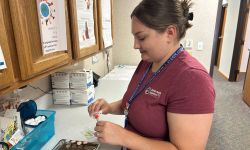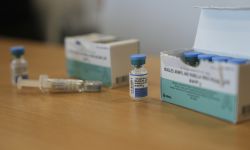RSV vaccine for older adults clears FDA, could be in Michigan by the fall

- The FDA approved the first vaccine to prevent RSV. It’s limited to adults 60 and older and could be available by fall
- A vaccine to protect infants is likely to be approved later this year
- RSV is usually not serious, but can be deadly for adults with weakened immune systems or underlying conditions
The first vaccine to protect older adults against RSV — respiratory syncytial virus — could be available as soon as this fall.
The U.S. Food and Drug Administration on Wednesday approved the vaccine for people 60 years of age and older.
Arexvy, developed by GlaxoSmithKline Biologicals, still must be vetted by the federal Advisory Committee on Immunization Practices, part of the U.S. Centers for Disease Control and Prevention, which is scheduled to meet June 21-22. That means the vaccine could be available to the public before the start of RSV season this fall, according to the drugmaker.
Related:
- Another respiratory virus, RSV, is surging in Michigan children
- FDA authorizes another COVID booster for older people. What you need to know
- Two in five Michigan nurses plan to leave their jobs, survey finds.
Arexvy is the first of several RSV prophylactics to near the finish line. The pharmaceutical behemoth, Pfizer, has also developed an RSV vaccine for older adults, and a RSV vaccine to protect newborns.
And working together, drugmakers Sanofi and AstraZeneca are developing monoclonal antibodies that would protect babies during the RSV season.
Highly contagious RSV, perhaps better known for causing sickness in very young children, infects the lungs and breathing passages in individuals of all age groups. Cases typically increase during the fall and peak in the winter. But the virus also surged mysteriously in the summer of 2021 among Michigan’s children. It returned late last summer, with cases packing children’s hospitals throughout Michigan and the U.S. through Thanksgiving as part of a tripledemic that included flu and COVID.
Among adults 65 years and older, RSV leads to about 177,000 hospitalizations and 14,000 deaths a year, according to the CDC.
Among older patients, RSV commonly causes lower respiratory tract disease (LRTD), which affects the lungs and can cause life-threatening pneumonia and bronchiolitis, in which small airway passages in the lungs swell.
Decades in the making, the vaccine is “an important public health achievement,” Dr. Peter Marks, the director of the FDA’s Center for Biologics Evaluation and Research, said in a statement released Wednesday.
Still, the vaccine is not expected to be as sought after as some other vaccines, including COVID, for example. For most healthy people, RSV is “little more than a common cold,” said Dr. Glenn Dregansky, president of the Michigan Academy of Family Physicians.

Dregansky said he wanted to review the data before supporting the vaccine whole-heartedly, even for at-risk individuals. It may be that healthy people among Michigan’s 2.5 million adults 60 and older can forgo the shot after considering their own risk-benefit analysis.
It’s “likely a good vaccine and likely a safe vaccine,” Dregansky told Bridge Michigan, “and everyone should have a conversation with their treating physician about whether it’s right for them.”
People with underlying conditions affecting the heart and lungs are especially at high risk if they contract RSV, but even among healthy people, aging brings the weakening of immune systems, said Dr. Teena Chopra, professor of infectious diseases at Wayne State University.

“I’m very excited,” she said. “We lose a lot of seniors to this (virus) every year.”
In evaluating Arexvy, the FDA reviewed data from a randomized, placebo-controlled clinical study conducted around the globe in people 60 years and older. Individuals will remain in the study through three RSV seasons to gauge the vaccine’s effectiveness.
In its first year, the study followed 25,000 people — half who received a vaccine, while half received a placebo.
The vaccine significantly reduced the risk of developing RSV-associated lower respiratory tract disease by 82.6 percent compared to those who received the placebo; and it reduced the risk of developing severe disease by 94.1 percent.
The Pfizer vaccine to protect infants would be given to pregnant people in the second half of their pregnancy. The vaccine is 82 percent effective in protecting the newborn against RSV, according to Pfizer and a study published in April in the peer-reviewed New England Journal of Medicine.
In the adult vaccine approved Wednesday, the most commonly reported side effects in a subset of participants were “injection site pain, fatigue, muscle pain, headache and joint stiffness/pain,” according to the FDA.
But some respondents, both in the vaccine and in the placebo groups, reported atrial fibrillation in the first study. In two other studies, researchers reported rare cases of an inflammation of the brain and Guillain-Barré syndrome, a disorder in which the body’s immune system damages nerve cells, according to the FDA, which is requiring the company to conduct more research.
See what new members are saying about why they donated to Bridge Michigan:
- “In order for this information to be accurate and unbiased it must be underwritten by its readers, not by special interests.” - Larry S.
- “Not many other media sources report on the topics Bridge does.” - Susan B.
- “Your journalism is outstanding and rare these days.” - Mark S.
If you want to ensure the future of nonpartisan, nonprofit Michigan journalism, please become a member today. You, too, will be asked why you donated and maybe we'll feature your quote next time!








